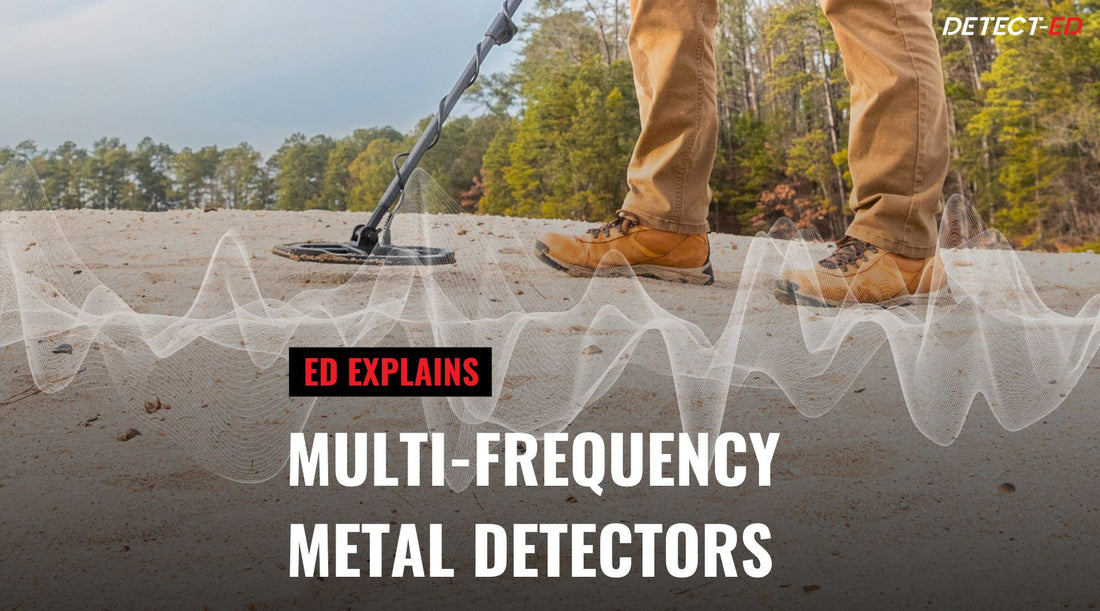Almost all high end coin, relic, treasure and beach metal detectors use Simultaneous Multi Frequency technology or “Multi Frequency” for short, but what is a multi frequency metal detector?
What is a Multi-Frequency metal detector?Multi frequency metal detectors are a subcategory of VLF metal detectors. In general, VLF metal detectors are known for their incredible ability to distinguish between different types of metal targets because they can identify how conductive the piece of metal is, unlike Pulse Induction (PI) metal detectors which can not do this. This is what makes VLF metal detectors ideal for trashy areas where the user may want to be selective about which targets they dig.
Until recently, we only had single frequency VLF metal detectors which (as the same would suggest) run on one single frequency, the Simplex Ultra for example runs on 15kHz which is a very nice general purpose frequency and the Gold Finder 2000 runs on a much higher frequency of 61kHz which is orientated towards gold prospecting.
Multi-Frequency metal detectors like the LEGEND, DEUS 2 and even the newly announced Nokta SCORE utilize multiple VLF frequencies at the same time to enhance performance.
In the case of the Nokta Legend, it has a range of frequencies it can use from a very low 4kHz to a very high 40kHz allowing it to detect a broader range of metal alloys easily and at greater depths.
What are the advantages of Multi Frequency Metal Detectors?There is a very good reason so many metal detectors use multi-frequency technology these days and the advantages certainly aren’t imagined.
Salt performance:
Multi Frequency metal detectors generally have the advantage in detection depth through wet salt sand and when fully submerged in salt water. When comparing single frequency and multi-Frequency detectors on dry sand, their performance is very similar but as you venture further down the beach and the sand gets more saturated, the advantage of multi-frequency metal detectors becomes greater as they tend not to lose much depth or sensitivity. This allows them to detect deep gold and coins easily even when they are totally submerged in salt water.
Single frequency detectors are often limited in their ability to scan through salty wet sand or salt water. Often users at the beach will discover that their single frequency detector will become erratic or lose depth when the coil is swung over wet salt sand or submerged in salt water but Multi frequency detectors are almost immune to this making them some of the BEST Metal detectors for the beach.
Enhanced Target-ID:
Most VLF metal detectors use a number which appears on the LCD screen to indicate the type of metal being detected. Highly conductive metals like copper and silver will typically produce a high number (on the screen) when detected and low conductive metals like small pieces of aluminum will produce lower numbers. We call this number on the screen the “Target ID”.
The target ID on metal detectors however is not 100% accurate and the accuracy of the target ID drops off with the depth of the target, that is to say that deeper metal objects are more difficult for the metal detector to identify.
Most multi frequency detectors do however have an advantage at identifying deeper targets. This means that the target ID is more reliable and accurate when it comes to deeper targets and is especially useful when you have very specific targets in mind like coins for example and allows you to be extremely selective about which targets you dig up.
Variety of target types and modes:
Because Multi-Frequency metal detectors are running a range of detection frequencies, they are generally much better at detecting all types and sizes of metal targets. The multi frequency detectors aren’t limited to just finding coins or just gold prospecting but can generally do both very effectively.
MF detectors also tend to have a variety of search modes like “beach”, “park” and “goldfields” for example. These modes are specialised for their respective jobs and utilize varying sets of frequencies to best deal with the types of soils in these conditions as well as provide the most sensitivity to the targets you are likely to encounter in these areas.
The Legend for example has “park, field, beach and goldfields” modes available.
What are the disadvantages of Multi-Frequency?Price: Typically you’ll find that multi frequency metal detectors are pricier as they are in the higher end range of metal detectors. At the same time, multi frequency detectors are often multi purpose and can be used in a range of detecting scenarios meaning that you won’t need multiple detectors.
EMI: Electro-Magnetic Interference (EMI) is something that affects all metals detectors to a degree. Essentially any form of electricity flowing or radio waves can adversely affect the performance of your metal detector. Multi Frequency detectors can be more affected when used in their multi frequency modes but in saying that, many multi frequency detectors can be used on a single frequency if EMI becomes a big problem.
Multi Frequency VS Pulse Induction Metal Detectors.What is the difference between Pulse Induction Metal Detectors and Multi-Frequency VLF metal detectors? The two major differences between Pulse Induction (PI) and any type of VLF metal detector is that the PI detectors have little or no way of telling the user what type of metal they are detecting but they generally punch deeper into the ground especially if the ground is highly mineralised.
Put simply, PI metal detectors are great for finding extremely deep pieces of metal where there isn't much trash laying around. The VLF detectors may not detect as deeply but they give fairly accurate indications of the target being detected which gives the user the choice to dig or continue swinging.
The fantastic thing about multi-frequency detectors is that they are no harder to use than single frequency detectors, in fact they are often easier to use because they require fewer changes to the settings. Muti-Frequency metal detectors tend to operate smoothly over more varied soil types than their single frequency counterparts.
Which metal detectors use multifrequency?At our store, Detect-Ed Australia we stock a range of Multi-Frequency metal detectors including:
- Nokta Legend
- XP Deus 2
- Nokta Score
- Nokta Score 2


